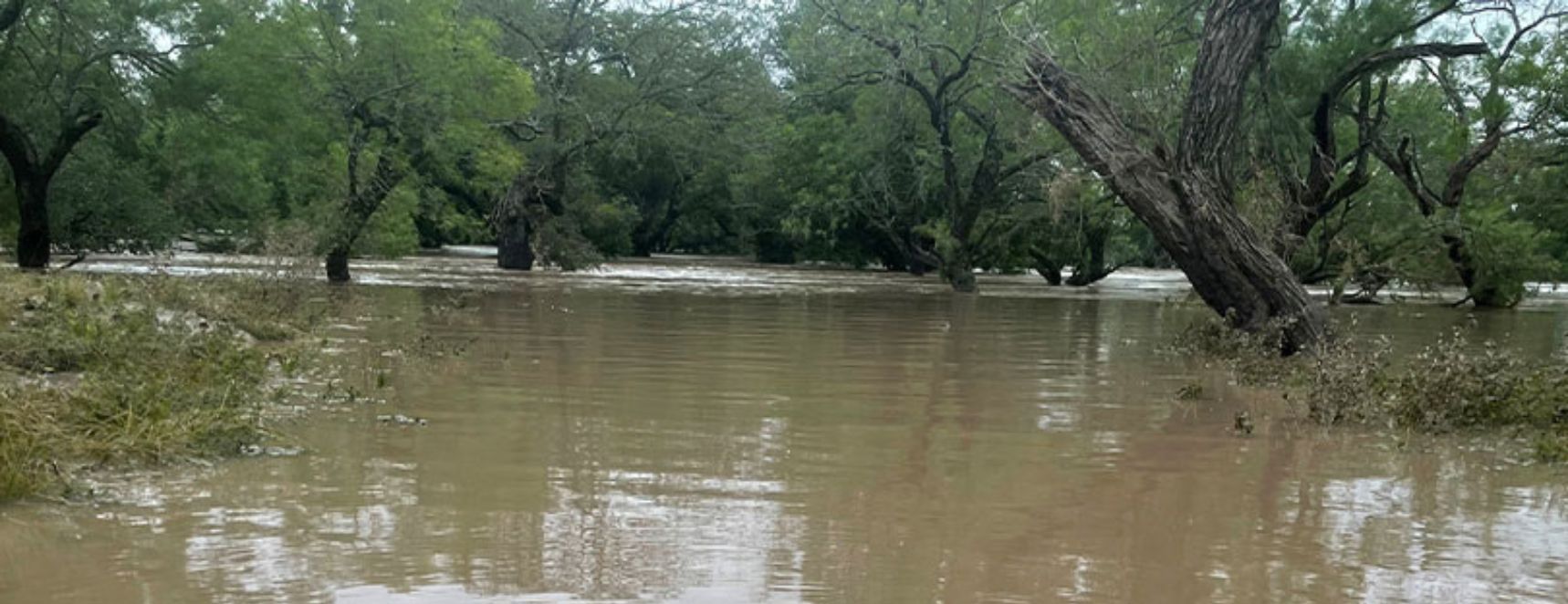
San Saba Farmer Faces Flood Damage to Pecan Orchards, Pastures
Rain finally came to San Saba and brought with it massive flooding.
What started as a welcome reprieve from relentless drought turned into disaster as floodwaters swept across farms and ranches, tearing through fences, submerging fields and putting livestock in danger.
Winston Millican, a fifth-generation pecan farmer, has seen floods before. But two in one week—first on July 4, then again just days later—brought a different kind of destruction.
“We’ve been tormented with drought for so long that the trees are unhealthy,” Millican said. “This was very much of a blessing for the older pecan trees. The younger ones, the ones we planted this year, the water bent them over.”
As soon as the water receded enough to wade in, Millican and his crew stood up about 250 young pecan trees, staking them into the ground and surrounding them with cages to protect them from wildlife. He estimates at least 20% of one orchard is lost.
“If the current reached up into the canopy, it snapped the trees,” he said. “If it stayed below, they were fine.”
But the damage stretches far beyond the trees themselves. Fences meant to keep deer out of the orchards are gone, as are the fences for his cows. Irrigation lines were damaged. Pumps, control panels and pressure tanks were swept away or buried under layers of silt and debris after the river rose above the irrigation wells.
They had just finished stretching 2.5 miles of fence after the first flood, only to have the second flood wipe it out again.
Millican estimates they’ll need to repair about seven miles of fencing, and he’s still looking for cattle lost in the floods, unsure how many will be found.
“Growing up, we had floods pretty often. I thought that was normal,” he said.
But then came a long dry spell. From 2004 to 2018, there were no floods. And then there was another seven-year dry period before the floods returned this year.
“I would much rather have a flood than a drought because I know how long a flood’s going to last,” Millican said. “I know that the water’s going to go down sooner or later, but a drought just feels like it is a never-ending weather pattern.”
While Millican’s family is focused on recovery, he’s mindful of others who suffered even greater losses.
“We have a lot of damage, but we didn’t lose any lives,” he said. “What happened in the Hill Country is devastating.”
This July’s flooding follows a brutal stretch of dry weather in the San Saba area. Millican’s pecan trees have been stressed with intense heat and lack of rain.
“When you go 60 to 90 days without rain, and you’re not pumping water on them, the trees are just using up what they have,” he said. “It’s been really tough growing conditions.”
Even before the floods, it was already a tough year for pecans. An early freeze and two hailstorms had set the crop back.
And the flood scattered gravel from the county roads into the orchards, which will complicate harvest.
“Pecan equipment and rocks don’t mix,” he said. “We’ll have to be creative on how we harvest this year.”
But he’s hopeful. Hopeful for a decent crop this year and even more optimistic that this year’s rains and floods will set up the trees for a successful crop next year.
“The rain is really too late for this year’s crop, but next year could be a good one,” he said. “We’re always looking ahead because the things you do now affect next year’s harvest.”






